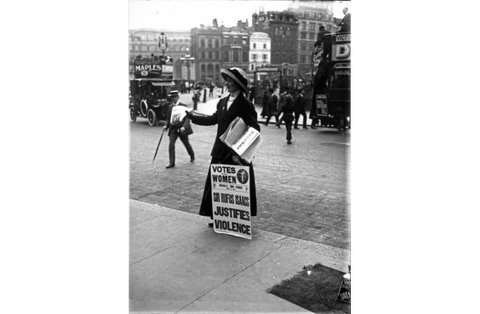General Articles
Shopping for a Party

Julia Moore is a lecturer in law, and project manager for a variety of educational projects both in the UK and Europe. Dividing her work and living between the UK and France, she frequently advises start-up organisations in the not-for-profit sector, and produces educational material for a range of establishments. She is currently developing e-learning resources for the international education market.
Shopping for a Party: What will inspire women in the UK May General Election?
As we lurch towards the UK's General election (6th May), the female vote has, more than ever, become the next 'must have', for the main contenting parties. If you tune into any media you - a female voter - will be appeal to, patronized, challenged, coo-ed at and cajoled. But how have female voting patterns fared since full enfranchisement (1928), and what will be different in 2010?

The legacy of struggle for suffrage continues to affect the way that women vote. Male voters, enjoying a longer voting history, tend to stick to family/work-culture voting patterns. This is largely explained by the phenomenon that males often followed fathers into their professions/ trades and, with that, came engrained political/family adherence. The seismic shift in social mobility which was the Thatcher period (Essex-man goes into the City, earns millions, nouveau-riches, 20th Century style) began to erode such traditions and co-incided with fuzzy patterns to match a blurring of traditional, English class- voting loyalties.
The 'ladies', by contrast, emerged onto political the scene via an altogether different, suffragette route, with vastly different backgrounds even within the UK, and thus their loyalties and with whom they identify is much more complex.
Common themes over the decades can be seen: women as main carers, household income managers, consumers and family health-watchers. Listen to any current hustings targeted at women and they are subtlety categorized as any of the above. Women voters, according to the scant research on such patterns since 1930s, are much less likely to stick to party loyalty voting and, therefore, could be vital pivots in marginal voting areas, especially with a much-hyped hung Parliament in the pipeline. The rising trend of single-living, also erodes the tendency to follow husbands or fathers into the voting booth. Single-issue parties are popular with women (environmental concerns, and mumsnet.com attest). There also is much ambiguity as to the efficacy of employing key females in profile political campaigns. The result can often be the reverse effect, so male politicians beware- wheeling out your wife, in best bib and tucker has more to do with satisfying internal party criteria and maybe not a female vote-winner. We are, after all a difficult creature to classify and package, thank goodness.
So, in 2010, we still struggle to see, or value the 'female identity' - she appears to exist only in respect of representing 'something', or 'as' something- usually supporting something/someone else (carer) or consumer (earning, and managing the household budget or obsessive leisure shopper). For many women, neither identifying nor falling into such categories, a reciprocal dilemma emerges - if a party cannot identify them, logic would say that they, too, cannot identify with a party, result? A valuable lost vote. Tragically still a lost opportunity to convey the daily concerns of millions of women into the political chamber, sustaining them and challenging existing obstacles to opportunity as per Pankhurst et al.
What will be different? Whether or not women voters are economic pragmatists, single-issue voters, keen to identify with a female political leader who inspires, or citizens who may not acknowledge the gender aspect of voting, the fact remains that many women, despite media tokenism and targeting may find less to identify with in 2010 than their cousins of 1928. Not only an absence of manifestos of interest to the 21st century female voter ( access to opportunity, equal pay, pension inequality), but a howling void of confidence that, once installed, their political representatives converge into a mass of drone-like slaves, merely adhering to the party line, lost in the faceless machinery of law-making.
In the meantime, many pro-active women and those who care for their communities - interested in more immediate returns - maintain a local profile, enhancing life for others within charities, often unwaged, displaying their own form of political role in a way that they, sadly, frequently undervalue themselves. As with the female entrepreneur, failing to value your own efforts remains the most significant factor in slow progress in the world of external business.




